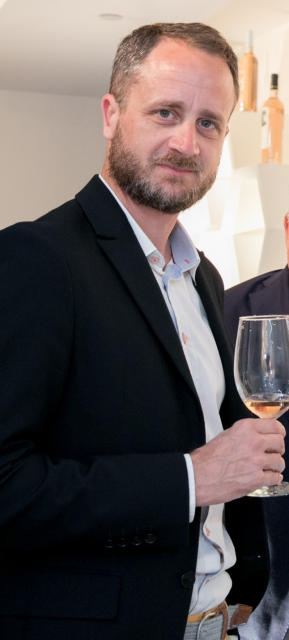Vins de Provence MD Brice Eymard: ‘We are making great progress on sustainability’
Over the last 30 years, rosé wine has become a force to be reckoned with. Today, one out of every three bottles of wine purchased in France is a rosé wine, with consumption more than tripling in 25 years. We caught up with Vins de Provence MD Brice Eymard to find out why sustainability is top of the agenda for the organisation.

In total, there are 564 producers (wineries, cooperatives & wine making merchants) and 100 local merchants operating in Provence today, with 167 million bottles produced in 2021. Of this total, 64 million bottles were exported, of which 96% was rosé. With all of this work taking place, we spoke to Vins de Provence MD Brice Eymard about the organisation’s EnViProv project, and how wineries are becoming more and more sustainable.
Could you tell us more about the EnViProv project and how it is being implemented?
“Last year, Provence launched the first wine industry project as part of the nationwide “FRANCE RELANCE” recovery plan designed to revitalise the French economy, and to speed up environmental, industrial and social change in France post pandemic.
“The EnViProv project runs to 2023 and aims to structure the transition to agroecology in the Provence wine region. It’s a 360° vision of the transition to agroecology, and covers three aspects: lifecycle analysis, support for environmental certification and the implementation of practices that embrace a virtuous circle.
“More specifically, lifecycle analysis encompasses everything from work in the vineyard through to the final marketing stage. This first aspect will involve quantifying the potential environmental impact of all industry activity across the entire Provence wine region.
“The second aspect, support for environmental certification, is overseen by the Côtes de Provence producers’ organisation which, since 2019, has been committed to a collective plan aimed at facilitating the implementation of HVE (Haute Valeur Environmentale) level 3 certification in vineyards. Farms are assessed on the basis of 4 criteria: their preservation of biodiversity,their reduction in usage of plant protection products and fertilisers and their water resource management. In 2021, we’re aiming to double the number of farms and provide support for a further 400 on their journey towards certification. Consequently, we estimate that we can achieve a 70% increase in HVE-certified land, equating to 6,700 hectares. The industry’s goal is to convert 100% of the wine region to organic or HVE by 2030.
“And finally, support for the industry and implementation of practices that embrace a virtuous cycle allows producers and merchants to make changes to their practices so that they can reduce their environmental impact. Using dedicated equipment, the Rosé Wine Centre will roll out Research &Development programmes and demonstrations to improve practices both in the winery and in the vineyard. Research will also be conducted on the technical and environmental impact of introducing practices that embrace a virtuous cycle on farms. The Provence Rosé Cluster, via its Living Soil group, will also carry out a research programme to analyse and improve biomass in soils. The goal is for 500 farms to receive individual support over a two-year period.”
What steps are wineries taking to become more sustainable?
“They are taking all sorts of different steps. One example of this, is the move towards Regenerative Viticulture which is a is a big step towards becoming more sustainable. This involves planting inter row cover crops, such as wheat, oat and clover, which will eventually improve the structure of the soil and its nitrogen levels. In addition, introducing livestock to vineyards allows for natural fertilisation and pruning of grasses, and vines weaned off pesticides and abundant irrigation makes the whole process is much more natural.”
Why is sustainability so important to the region?
“Sustainability is important not only to our region, but to the whole world. We’re trying to do our part to help combat global warming and preserve our planet for generations to come. Likewise, consumers, especially younger Millennials, are increasingly choosing their wine based on its sustainability credentials, so it’s important that we provide a high-quality sustainable product to meet their needs, all while retaining our quality positioning and our place as the global leader in Rosé.”
How do you aim to achieve the goal of converting 100% of the wine region to organic or HVE by 2030?
“The EnViProv project was designed to help everyone in the Provence region identify areas in which they can improve their sustainability efforts and also provide guidance on how to fully convert to organic or HVE. We evaluate 16 different criteria – from carbon to energy usage to biodiversity – and educate members of the wine region on the best practices for sustainability. The research and development parts of the programme make sure we have the most up-to-date practices and multiple ways of achieving this goal, as what works for one winery might not work for another. We are already making great progress, with almost 55% of the region already converted to organic or HVE.”
Want to find out more?
From 27-28 February, ‘Vins de Provence Expériences’ is taking place in Marseille, a trade show exclusively for Vins de Provences wines, featuring in-depth discussions, including masterclasses and panels, as well as a tasting zone and a prestigious opening event. 800 buyers and members of the trade from France and overseas are expected to attend.
You can find out more by clicking here.
Related news
Queen Camilla gives speech at Vintners Hall
Master Winemaker 100: Alberto Stella
Australian Vintage sales dip 1.7% as turnaround plan targets stronger second half
